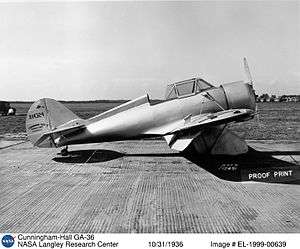Cunningham-Hall GA-36
The Cunningham-Hall GA-36 was an American two-seat monoplane modified from the GA-21M for the Guggenheim Safe Aircraft Competition.
| GA-36 | |
|---|---|
 | |
| Role | Military training monoplane |
| National origin | United States |
| Manufacturer | Cunningham-Hall Aircraft Corporation |
| Designer | Randolph Hall |
| First flight | 1934 (GA-21M) 1936 (GA-36) |
| Number built | 1 |
Design and development
The GA-21M was a two-seat low-wing monoplane designed and built in 1934 powered by a 145 hp (108 kW) Warner Super Scarab radial piston engine.[1] An all-metal aircraft, it had a fixed conventional landing gear with a tailwheel.[1] In 1935 the aircraft was rebuilt as the GA-36, first flying on 2 January 1936.[1][2] Part of the rebuild was a change from side-by-side to tandem seating and modified landing gear.[2]
No further aircraft were built and failing to find a buyer it was sold in 1941, (advertised for $2,950), stripped of major components and dumped until the 1980s, when it was recovered, fully restored and put on display at the Niagara Aerospace Museum.
Specifications (GA-21M)
Data from [2]
General characteristics
- Crew: 2
- Capacity: 775 lb (352 kg)
- Length: 20 ft 0 in (6.10 m)
- Wingspan: 30 ft 0 in (9.14 m)
- Powerplant: 1 × Warner Super Scarab 7-cyl. air-cooled radial piston engine, 150 hp (110 kW)
Performance
References
Notes
- Orbis 1985, p. 1216
- "American airplanes - Cu - Cy". www.aerofiles.com. 3 August 2008. Retrieved 2010-01-01.
Bibliography
- The Illustrated Encyclopedia of Aircraft (Part Work 1982-1985). Orbis Publishing.